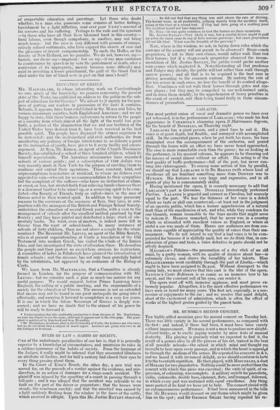LABLACI-IE.
THE most perfect union of vocal and dramatic power we have ever yet witnessed, is in the performance of LABLACHE ; who made his first appearance in CIMAROSA'S charming opera 11111atrimonio Segreto, for the benefit of DONZELLI, on Thursday night. LARLACHE has a giant person, and a giant bass to suit it. His voice is of great depth, but flexible, and managed with accomplished skill. In the concerted pieces, when he put forth his force, his bass dominated over the accompaniment of the orchestra, and pealed through the house with an effect we have never heard approached. The ease is more remarkable even than the power; for on looking at the performer, in his musical volcano, he appears to be throwing out his masses of sound almost without an effort. His acting is of the best quality of buffo performance—full of the part, but never run- ning into extravagance. To convey some notion of him by parallel, we should say that LARLACHE is to DE BEGNIS (with whose kind of excellence all are familiar) something more than Dol,vroN was to MUNDEN. His features are very large and expressive, and in all points of play he is consummately skilful. Having mentioned the opera, it is scarcely necessary to add that LABLACHE'S part is Geronimo. DONZELLI interestingly performed Paolino. LALANDE is graceful and correct as Carolina, but scarcely equal to the part. We fear the thinness of her voice is a defect which no taste or skill can countervail,—at least not in the judgment of an operatic public, which has a keener apprehension of a natural fault than of the excellencies of art, and who, while they condemn for one blemish, remain insensible to the finer merits that might serve to redeem it. ROSSINI remarked, that he never was in a country which so abounded with excellent voices as England, or where so sinful a use was made of them. Hence our audiences are from cus- tom more capable of appreciating the quality of voices than their ma- n age ment. We do not intend to say that a bad voice is to be com- pounded for because it is skilfully used, but we do think that, in con- sideration of grace and taste, a voice defective in parts should not be utterly despised. MALIBRAN'S Fidalma—tho personation of a dry stick of an old maid, by a pretty woman, with no quality of dryness about her—is extremely clever, and shows the versatility of her talents. Miss BELLCHAMBERS went creditably through the part of Lisetta,—which ought to have been assigned to BLASIS. Without disrespect to the young lady, we must observe that this cast is the blot of the opera. SANTINI'S Conte Robinson is as comic as an immense bow to his cravat, and the constant roll of his eyes, can render it. The opera went off with immense applause, and must prove ex- tremely popular. Altogether, it is the most effective performance we have seen or heard for many years. The first act, especially, is a suc- cession of enjoyments to the ear ; and we receive that quiet delight, short of the excitement of admiration, which is often the effect of works of the highest genius guided by the purest taste.


















 Previous page
Previous page